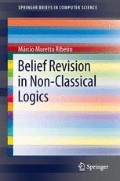Abstract
Recovery is certainly the most controversial AGM postulate. Since the first publications in the area many works criticize several aspects of recovery. In order to avoid the undesirable consequences of recovery, Hansson proposes to exchange it by a postulate called relevance. However, in classical logics relevance and recovery are equivalent. In this chapter, we defend the use of relevance instead of recovery in non-classical logics for mainly three reasons: relevance deals more directly with minimality, it is compliant with a wider class of logics, and it better characterizes partial meet contraction.
Access this chapter
Tax calculation will be finalised at checkout
Purchases are for personal use only
Notes
- 1.
This theorem uses some lemmas presented in the following section.
References
André Fuhrmann, Sven Ove Hansson. A survey of multiple contractions. Journal of Logic, Language and Information, 3(1):39–75, Janeiro 1994.
Giorgos Flouris. On Belief Change and Ontology Evolution. PhD thesis, University of Crete, 2006.
Giorgos Flouris, Dimitris Plexousakis, and Grigoris Antoniou. On applying the AGM theory to DLs and OWL. In Enrico Motta Yolanda Gil, V. Richard Benjamins, and Mark A. Musen, editors, Proceedings of the 4th International Semantic Web Conference (ISWC 2005), pages 216–231, Galway, Ireland, November, 6-10 2005. Springer.
Giorgos Flouris, Dimitris Plexousakis, and Grigoris Antoniou. On generalizing the AGM postulates. In Proceedings of the 3rd European Starting AI Researcher Symposium (STAIRS-06), 2006.
Sven Ove Hansson (1991) Belief contraction without recovery. Studia Logica, 50(2):251–260
Isaac Levi. The Fixation of Belief and its Undoing: Changing Beliefs through Inquiry. Cambridge University Press, Outubro 1991.
David Makinson. On the status of the postulate of recovery in the logic of theory change. Journal of Philosophical Logic, 16:383–394, 1987.
Reinhard Niederée. Multiple contraction. a further case against gärdenfors’ principle of recovery. In Proceedings of the Workshop on The Logic of Theory Change, pages 322–334, London, UK, 1991. Springer-Verlag.
Márcio Moretto Ribeiro and Renata Wassermann. First steps towards revising ontologies. In Proceedings of the 2nd Workshop on Ontologies and their Applications (WONTO 2006), 2006.
Márcio Moretto Ribeiro and Renata Wassermann. More about AGM revision in description logics. In Proceedings of the 2nd Workshop Automated Reasoning about Context and Ontology Evolution (ARCOE 10), Lisboa, Portugal, Agosto, 16-17 2010.
Author information
Authors and Affiliations
Rights and permissions
Copyright information
© 2013 The Author(s)
About this chapter
Cite this chapter
Ribeiro, M.M. (2013). AGM Contraction in Non-Classical Logics. In: Belief Revision in Non-Classical Logics. SpringerBriefs in Computer Science. Springer, London. https://doi.org/10.1007/978-1-4471-4186-0_5
Download citation
DOI: https://doi.org/10.1007/978-1-4471-4186-0_5
Published:
Publisher Name: Springer, London
Print ISBN: 978-1-4471-4185-3
Online ISBN: 978-1-4471-4186-0
eBook Packages: Computer ScienceComputer Science (R0)

